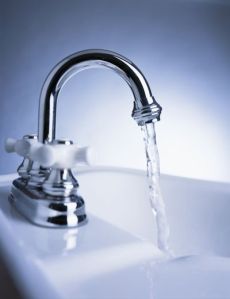Please visit us at www.preparednesspro.com.
Water Storage Myth: Treat your water and then store it.
Water Storage Fact: Actually, if you use regular tap water, it’s already treated. There’s no need to add any additional chemicals to it when it’s just going to be sitting in a container. If your water needs treatment, do so at the point of using it, not prior to storing it.
Water Storage Myth: Don’t store your water barrels on cement.
Water Storage Fact: Actually, there’s always a missing component to this myth. The key is not to store your water barrels on HEATED cement, and even that’s questionable advice. To store your water in your basement on the cement floor is just fine. There’s no need to make your barrels less stable by putting them on 2 x 4s. Cement only leaches chemicals when it gets hot. If you’re going to store your water in your garage, where the sun heats up the connecting driveway cement, then yes, I’d consider raising your barrels up on floor boards or such.
Water Storage Myth: Stored water tastes bad.
Water Storage Fact: Stored water is merely lacking oxygen. You can get it back to tasting great simply by pouring it back and forth a couple of times between a couple of pitchers, or glasses. This will infuse oxygen back into your water.
Water Storage Myth: I’ve got a pool out back for our water storage, so I don’t need to store any otherwise.
Water Storage Fact: One who has this opinion is taking a big risk, one which I would not venture to take. It’s presuming that no animal waste, nuclear waste, or other biological poisoning will enter the pool water. Also, if there is a water shortage in your area, and your big pool is out there for all of the desperate folks to see, you’re simply begging for some dangerous self-defense scenarios. You might as well leave your car doors unlocked with your wallet on the front seat. In the event of a real emergency, I would ALWAYS recommend that families store water as well as presuming that their pool water supply will be available, thus preventing it from outdoor contaminates and ensuring that you have water to survive in the event of all possible scenarios.
Water Storage Myth: I have iodine tablets and I know where the river is.
Water Storage Fact: You and everybody else. Just how long do you think that river supply is going to be available to you and your family? How useful will that river supply be to you in the event of a flood? Iodine tables don’t do too well with cleaning out home and body parts. How much vital physical energy will it take you to fetch enough water for you and your family to survive long term? People who have this attitude sure are taking a huge gamble. Remember that conserving your own physical energy should be your first priority in an emergency. So purposefully putting yourself in a situation in which you need to work hard for water is short-sighted. Also, you’re assuming that your iodine tablets will take care of whatever is in the outdoor water, regardless of what it’s been exposed to. (See previous myth/fact example) If you have water stored in quality containers in your home, you can save your physical energy for other more important tasks, and you will ensure that your water supply is protected and is YOURS. Not only that, but chemical treatment of water is not the safest. Heating your water, such as boiling it, is by far the safest method of treating your water.
You’re also assuming that you won’t be quarantined and that the streets will be safe to travel.
You are welcome to repost this information so long as it is credited to Preparedness Pro & Kellene Bishop.

